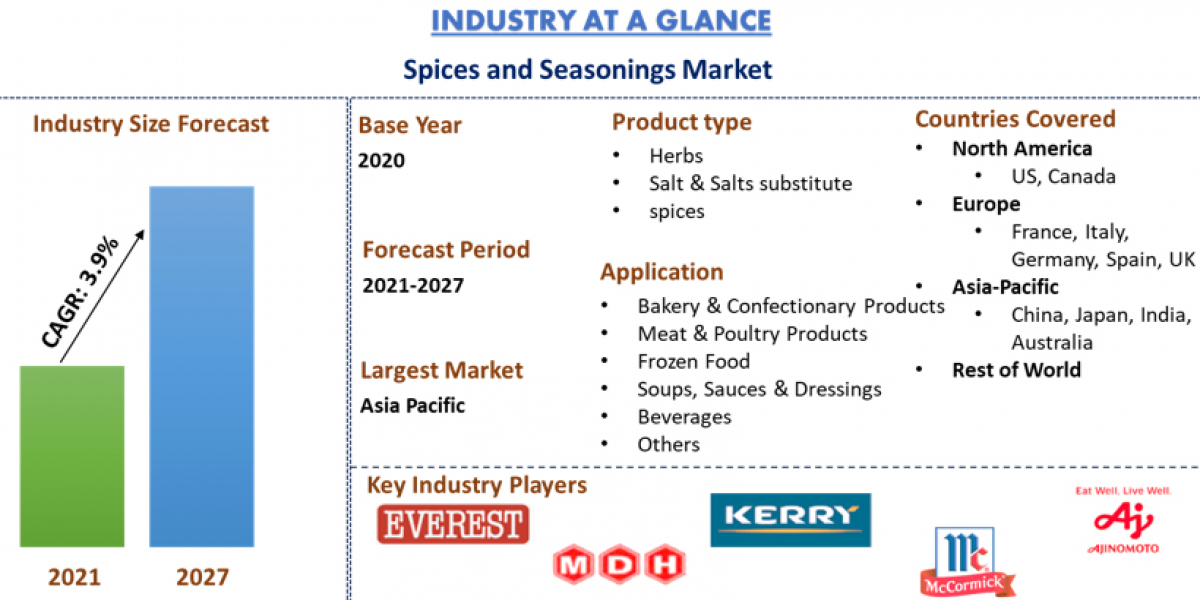Spices and condiments give aroma, color, and enhances the flavor of the food. Depending on various types of cuisines and origin of spices and condiments, they are available in different forms.
According to UnivDatos Market Insights, Spices and Seasoning Market was valued at US$ 25 billion in 2020 and is expected to grow at a CAGR of 4% over the forecast period (2021-2027).
For More Detailed Analysis in PDF Format, Visit- https://univdatos.com/get-a-free-sample-form-php/?product_id=6783
Increase in per capita spending of consumers on food and rising popularity of exotic cuisines are the significant factors driving the growth of the global spices and condiments market. The increase in international travel immigration and globalization has drawn consumer’s attention towards ethnic food. For instance, the United States retail sales of ethnic food increased from 11 billion in 2013 to 12.5 billion in 2018. The ethnic food mostly included Mexican, Asian, and Italian cuisine. The inclination of population across the globe has increased the demand for several indigenous spices and condiments. Furthermore, the rising consumer awareness about the ill effects like hyperactivity in kids, damage to kidney and liver, from the chemical food preservatives such as sodium benzoate, propionic acid, and benzoic acid has increased the demand of natural preservatives, which includes several spices. This trend is expected to increase the demand for spices and condiments
In 2020, the outbreak of Coronavirus illness (COVID-19) acted as a major hindrance on the seasoning and dressing manufacturing business, as supply chains were disrupted by trade restrictions and consumption fell due to government lockdowns around the world. The dynamics of worldwide spice commerce have been affected by certain Chinese and Indian policies. During the early phases of the outbreak, India blocked its borders fully, making it difficult to export any goods. In Vietnam, the same thing happened. The coronavirus outbreak has caused a dramatic drop in demand in China, a key buyer of Indian spices. As a result of this circumstance, the costs of various spices have decreased. For instance, the price of Indian cardamom fell by half in a week, and the price of Vietnamese pepper fell by around ten percent. Importers believe there may be some panic buying going on and that prices will rise once markets reopen.
Based on product type, the market is fragmented into herbs, salts & salts substitute, and spices. The salt & salts substitute segment dominated the market in 2020 and generated the total revenue of USD billion. It is anticipated to maintain its dominance during the forecast period owing to its consistent increase in demand in almost all types of dishes. For instance, as per Statista in 2019, salt consumption in China was highest with 10.9 gm of salt per person in a day, followed by Italy with 9.7 gm and India with 9.7 gm of salt consumed by an adult in a day.
The total import and export of spices, coffee, tea, and mate` observed a significant growth from 47,442,074 and 48,481,619 in 2016 to 49,871,612 and 49,753,116 in 2018, respectively. Due to the outbreak of COVID the worldwide import and export value observed a sudden fall in 2020 to 49,859,006 and 51,358,179, respectively. The change in consumer preferences of going out for eating and decline in demand for most popular ethnic cuisines worldwide were the major factors responsible. For instance, as per Deloitte 2020 Report, the consumption of Italian decreased to 60% in 2020 from 79% in 2019 and out-of-home consumption reached a negative peak of 45%.
Based on the application, the market is fragmented into bakery & confectionary products, meat & poultry products, frozen food, soups, sauces & dressings, beverages, and others. Owing to the shift in preference of consumers for the ethnic flavors and demand improvement in in the quality, the meat & poultry segment grabbed the major market and dominated the market in 2020 and generated the total revenue of USD billion. It is anticipated to maintain its dominance during the forecast period. Moreover, the segment is also expected to witness highest CAGR during the analyzed period.
Explore the Comprehensive Research Overview - https://univdatos.com/report/spices-and-seasoning-market
Additionally, the report provides detailed initiatives that are being taken in the field of Spices and Seasoning. The market is classified into distinct regions North America (United States, Canada, and the Rest of North America), Europe (Germany, France, Italy, Spain, United Kingdom and Rest of Europe), Asia-Pacific (China, Japan, India, and Rest of APAC), Rest of World has been conducted. Asia-Pacific dominated the market and generated revenue of USD billion in 2020 owing to the fast-paced emergence of marketing & promotional activities and growth of domestic brands in the region have led to a rise in the demand for the spices and condiments. Furthermore, the rise in disposable income and increase in economic growth has positively impacted on the demand of spice and condiments. For instance, as per IBEF, India produces 75 varieties out of 109 varieties listed by International Organization for Standardization (ISO) and accounts for half of the global trading in spices.
Related Consumer Goods Industry Reports:
Dehydrated Meat Products Market: Current Analysis and Forecast (2024-2032)
Maternity and Nursing Bras Market: Current Analysis and Forecast (2024-2032)
Protein Ice Cream Market: Current Analysis and Forecast (2024-2032)
Ready-to-Drink (RTD) Coffee & Tea Market: Current Analysis and Forecast (2024-2032)
Adventure Tourism Market: Current Analysis and Forecast (2024-2032)
Contact Us:
UnivDatos Market Insights
Email - contact@univdatos.com
Website - https://univdatos.com/









